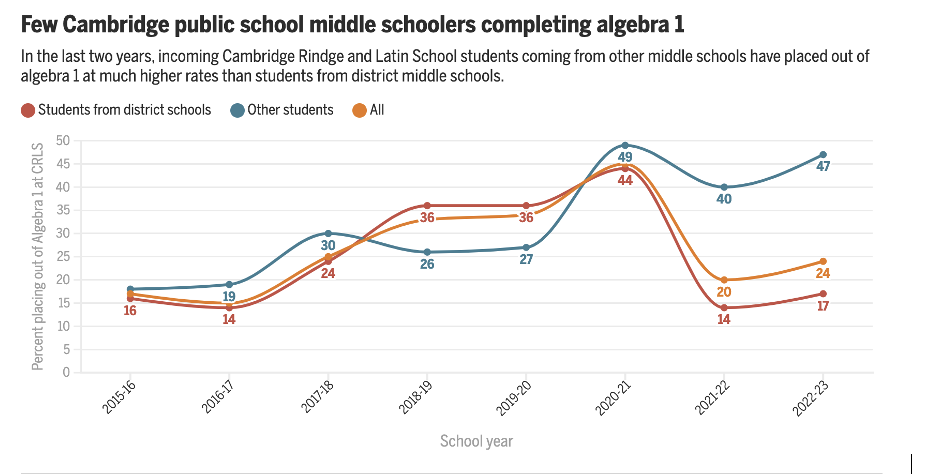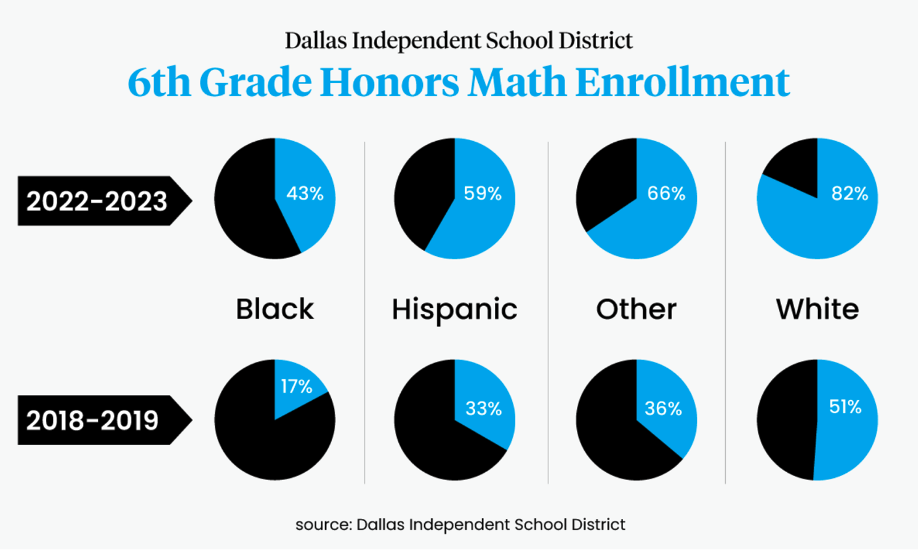The War on Math in Boston-Area School Boards
The standard line in U.S. education policy debates has long been that more money and greater access yield better results for all students. Despite increased polarization on key education issues, it’s not incorrect to say that the last 20 years of national education policy revealed a remarkable level of bipartisan agreement that students deserve equal opportunity to succeed in school. Presidential administrations of both parties championed their respective legislation and executive action that expanded charter school funding, STEM course offerings, visual and performing arts programs, and early reading education.
These reforms, in large part, have subscribed to the philosophy that building students’ knowledge bases, reading skills, and arithmetic performance at an early age is foundational to academic success in high school, college, and beyond. They’ve also been supported by comprehensive public policy research, like the Rand Corporation’s 2023 report on “Getting Students to (and Through) Advanced Math.”
In examining performance gaps in poor and rural schools, Rand’s national inquiry of STEM educators found that uneven access to accelerated math at the middle school level — a requirement if students plan to take calculus by the time they graduate — was a key factor in determining whether students were poised for success in the subject.
Such insight raises two important questions. First, why has Cambridge, Massachusetts — a city neither poor, rural, nor undereducated championed the recent and very deliberate abolition of its middle schools’ advanced math program as a victory for “equity” and “inclusion”? Second, how will Cambridge’s prohibiting students of any ability from taking on the challenge of accelerated mathematics yield greater success and achievement?
The school board obfuscates their destruction of accelerated math by giving their war on merit and talent the sterilized “detracking” misnomer. They reason that prior underrepresentation of low-income children of color in middle school accelerated math classes is evidence of the entire program’s failure to provide equal and comprehensive math education to anyone. They prefer that students of ranging abilities receive a simplified, one-size-fits-all curriculum (“track”) that needlessly postpones algebra until Grade 9.
By disbanding accelerated classes — which are blatant evidence of prevailing achievement gaps in their outsized representation of Asian and (to a lesser extent) white students — the board mistakenly thinks it is rectifying the very same achievement gap that resulted in advanced math classes’ “imbalanced” demographics. If there are no advanced math classes, then of course there are no high-achieving students, which means there are no low-achieving students, which then means every student is a high achiever.
Unfortunately, such blatant ostrich policy is not limited to Cambridge. Nearby Belmont recently eliminated its advanced math program to the dismay of parents, while across the country school districts in San Francisco and Los Angeles weigh similar reforms that threaten to disenfranchise the brightest of public school children while doing nothing to improve educational quality and accessibility for underserved groups.
Evidence suggests that Cambridge’s reforms, in practice, may be catalyzing even greater inequality of educational opportunity. Recent reporting from the Boston Globe outlines how wealthier parents responded to the new math curriculum by transferring their children to private schools or enrolling them in after-school tutoring programs like Russian Math and Kumon, both moves likely to increase income-based educational gaps rather than depress them. Since the reduced math curriculum’s introduction, students who place out of algebra upon arrival at Cambridge high schools now disproportionately come from private schools. Those from public middle schools are nearly one-third less likely to join the advanced math track, as the few remaining public schoolers who do qualify rely on expensive extracurricular tutoring to advance beyond their peers. What a triumph of “equity.”

After removing accelerated math course offerings from its public middle schools, the rate of students placing out of Algebra 1 fell from 44% to 14%
Source: The Boston Globe • Christopher Huffaker/Globe Staff
As coastal, hyper-progressive school boards like those in Massachusetts and California remain embattled with public rancor over mathematics reform, Texas and its Dallas Independent School District offer a potential solution which is diametrically opposite in approach, and promises to be more than twice as effective at placing students of all demographics on the calculus track. Rather than remove accelerated math courses for middle schoolers, Texas’ second largest school district made them mandatory for everyone, allowing students the ability to opt out with written parent permission.
The expanded accelerated math offerings, according to a report from education news watchdog The 74, resulted in substantial increases in the number of students taking Algebra 1 before high school, from 20 percent to 60 percent. Particularly impressive was the lack of mathematics performance drop-off across all demographics following the Dallas district’s new policy, a clear indication that students were as prepared for high school math beyond algebra as in years prior.

After Dallas Independent School District made advanced math mandatory with an opt-out, students of all demographics were more likely to participate.
Source: the74million.org
The latest national tests show students’ math performance declining across the country, even as foundational knowledge in the STEM fields becomes ever more important for young Americans’ employment ambitions. Thus, closing down accelerated programs and de facto curtailing access to challenging curricula for all but the wealthy few only exacerbates educational disparities while ignoring the persisting achievement gaps across racial demographics.
Instead, school board members and other policymakers would be wise to expand advanced math courses to the greatest number of students, ensuring their equal opportunity for success by challenging each student according to his or her aptitude. After all, we used to be told that challenging math refined, among other things, an individual’s problem-solving skills. How about testing the Texas solution to see if it cancels out?



